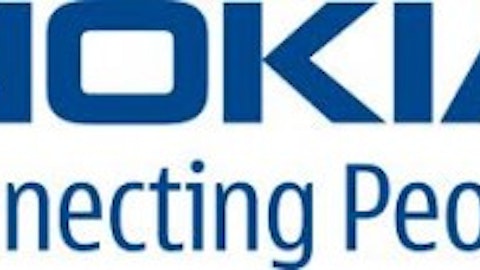Alcatel Lucent SA (ADR) (NYSE:ALU)’s newly appointed CEO, Michel Combes, recently announced plans to cut costs. Combes said he aims to raise 2 billion euros ($2.7 billion) by 2015 through job cuts and asset sales.
After Combes joined the French-American telecom networking equipment maker in April, he has been trying to refocus the company on strengthening its position in the wireless broadband equipment business. Alcatel Lucent SA (ADR) (NYSE:ALU) already has one of the most valuable patent portfolios in the world.
Though shareholders have been optimistic about his plans, there is a lot of uncertainty as the company has already lost much of its market share to competitors. Combes’ predecessor, Ben Verwaayen, had also announced massive restructuring plans and job cuts between 2010 and 2012. However, Verwaayen failed miserably to stop sales declines and generate profits.
Michel Combes is the right man for the job
I believe Michel Combes has all the necessary capabilities to revive the company. He has a history of massive cost reduction. With more than 20 years of experience in the telecom industry, Combes successfully led a 2 billion pound ($3 billion) cost cutting program at Vodafone Group Plc (ADR) (NASDAQ:VOD). He reduced expenditures on network gear and logistics, and slashed headcount at the British firm. He also changed pricing strategies across Europe, the biggest market for Vodafone Group Plc (ADR) (NASDAQ:VOD), tying data tariffs to consumption. Combes has also overseen finances at France Telecom.
Anybody who thinks Alcatel Lucent SA (ADR) (NYSE:ALU) can’t make a comeback should think of Ericsson (ADR) (NASDAQ:ERIC). The Swedish company was also on the verge of collapse about 11 years ago. But rather than giving up, Ericsson (ADR) (NASDAQ:ERIC) refocused itself on its mobile equipment business. It had to slash more than 50,000 jobs worldwide, that was about half of its total workforce. Meanwhile, low cost Chinese equipment makers like Huawei Technologies and ZTE were eating into its business. It took Ericsson more than four years to halve its workforce and regain the lost business. Today, Ericsson is the world’s largest wireless networking equipment maker.
Not without challenges
Alcatel Lucent SA (ADR) (NYSE:ALU) is grappling with a number of challenges. The biggest challenges are excessive workforce and over-diversification of its business. Let’s look at the workforce problem first. According to Bloomberg, the company’s quarterly revenue per employee is 49,700 euros ($63,600,) compared to 58,280 euros for Ericsson and 57,770 for Nokia Siemens Networks (NSN.) It means the French-American company employs more workers to generate revenues.
To match the sales per employee (or productivity) of its major competitors, Alcatel Lucent SA (ADR) (NYSE:ALU) has to cut its workforce from about 72,000 worldwide to less than 62,500. It has to cut the headcount and make its employees more productive.
Alcatel Lucent SA (ADR) (NYSE:ALU)’s product portfolio is massively diversified: wireless (CDMA), network division (Optics and IP), wireline (broadband), enterprise segment, and software services segment. Yes, I admit that diversification can be a good strategy, but over-diversification has taken its toll on the company so far.
Along with these two challenges, Alcatel Lucent is facing another big threat: Cisco Systems, Inc. (NASDAQ:CSCO). The John Chambers-led company is undergoing a massive transition with a focus on intelligent networks and technology. Cisco Systems, Inc. (NASDAQ:CSCO) is moving towards flexible, programmable and virtual networks. Despite the transition and uncertain macroeconomic conditions, Cisco’s earnings rose at twice the pace of revenue growth in FY12.
Cisco recently launched the CRS-X 400 core router that will allow customers to improve their routing systems and scale network capacity. Internet traffic growth, separate IP and optical networks and limited scale have been a headache for customers, and they have gotten an excellent solution in the CRS-X 400. This product boosts port densities by a factor of three compared to its nearest competitors, and lowers power consumption.
What should Alcatel Lucent do?
Along with slashing headcount, Michel Combes has to sell businesses that have become a burden on the company, like the optics and wireless divisions.
In my view, IP networking is the only unit adding value. Alcatel-Lucent expects the division to generate $9.4 billion in annual revenues with over 12.5% operating margin in 2015. The operating margin part seems pretty ambitious given just 2.4% operating margin in 2012.
I agree with Exane BNP Paribas analyst Alexander Peterc, that the company should exit its submarine optical cable business, which owns the undersea intercontinental trunk lines. Alcatel Lucent has also indicated in the past that it might sell its enterprise business. Selling these two businesses should fetch the bulk of the 1 billion euros that Combes plans to raise through asset sales by 2015. That will buy some time to bring the company back around.
Alcatel Lucent still has a lot of growth opportunities to make a comeback. It has a room for growth in Network Function Visualizations (NFV) and Software Designed Network (SDN). I think Combes should focus on cloud computing, and develop a service architecture that will support future cloud applications as well as future network services. He is blessed with one of the most brilliant R&D teams; he should exploit the opportunity to create compelling products and systems.
Bottom line
Michel Combes’ turnaround plan may be a little late as the company has already lost a major chunk of its market share to competitors. But the man has capabilities, and his plans are likely to generate extra value for Alcatel Lucent. A turnaround is possible only through slashing the workforce, intensive cost cutting and emphasis on new technologies.
However, given the fierce competition and macroeconomic uncertainty, investors should wait to see how the new CEO’s cost cutting plan goes before jumping in. I expect a positive trend.
The article Alcatel Lucent Revival Plan: Should You Jump In? originally appeared on Fool.com.
Vikas Shukla has no position in any stocks mentioned. The Motley Fool recommends Cisco Systems. Vikas is a member of The Motley Fool Blog Network — entries represent the personal opinion of the blogger and are not formally edited.
Copyright © 1995 – 2013 The Motley Fool, LLC. All rights reserved. The Motley Fool has a disclosure policy.





